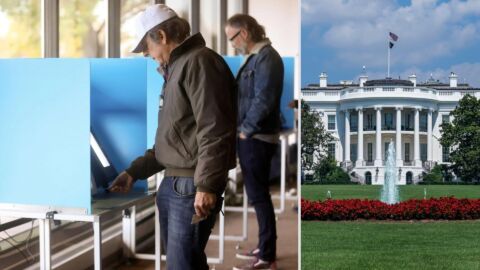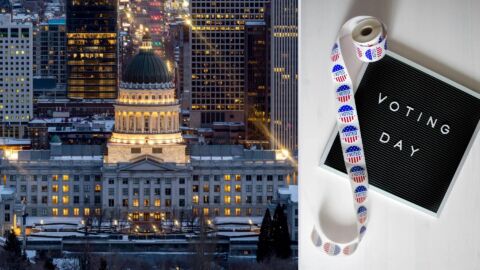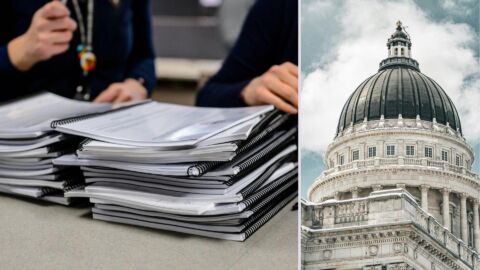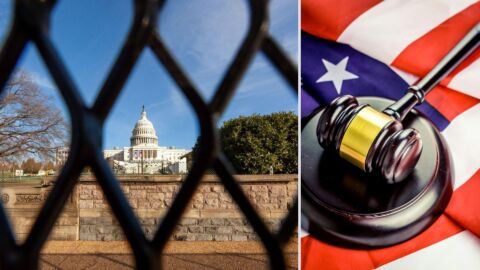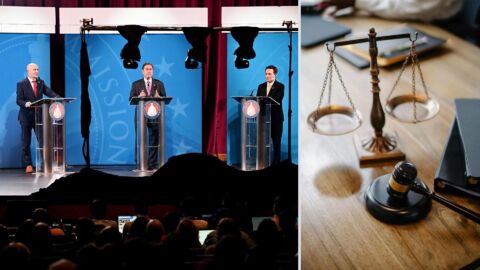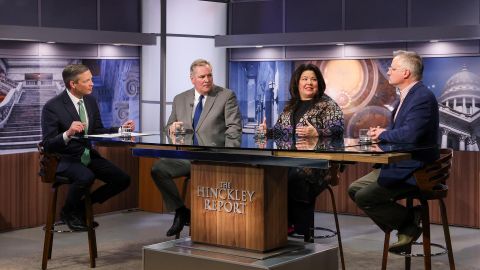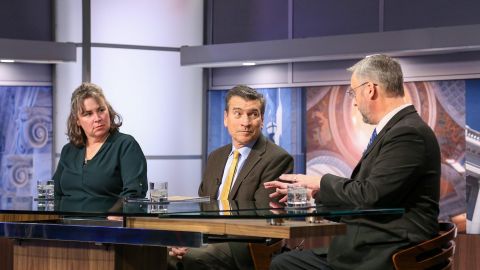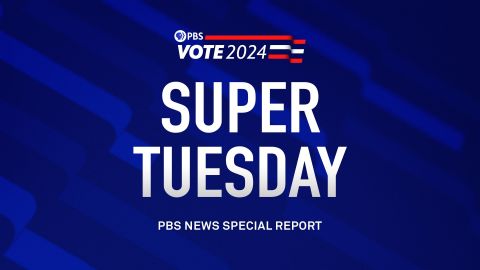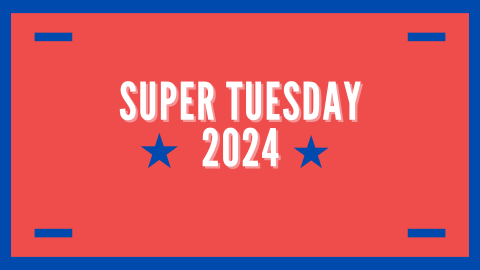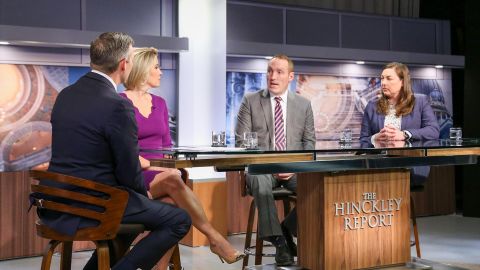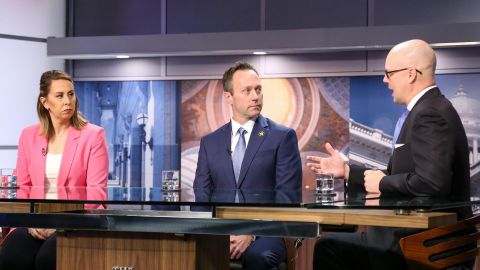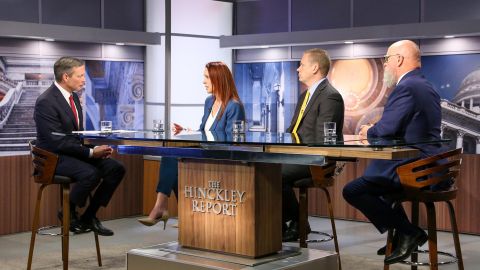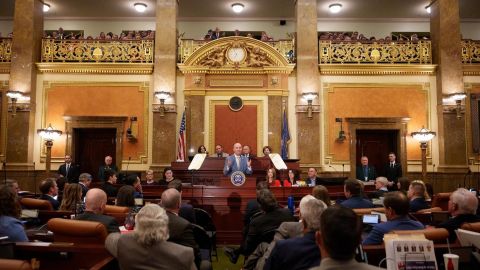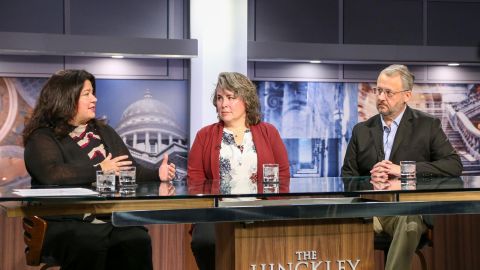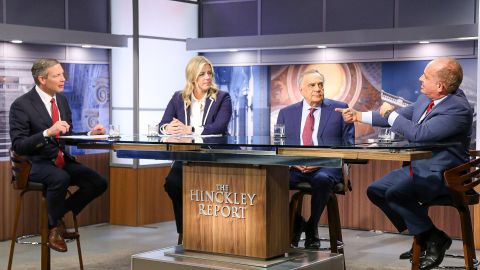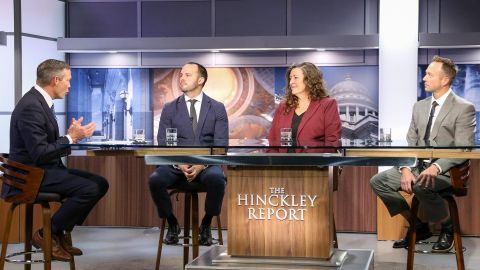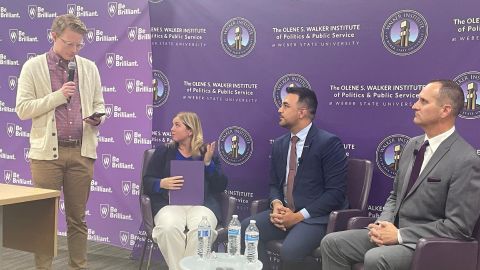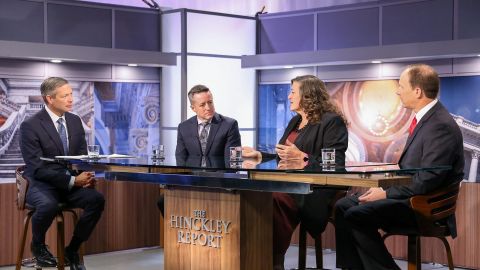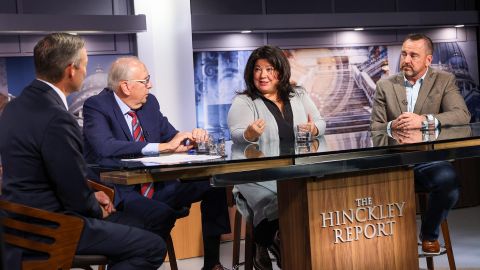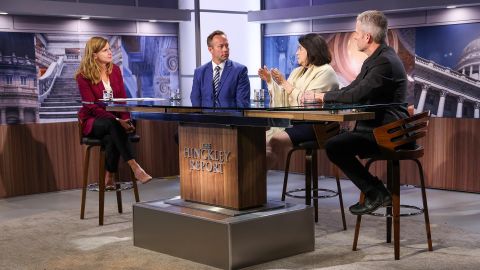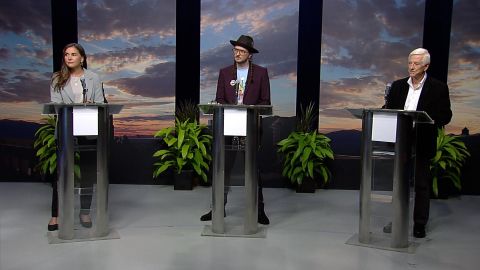announcer: Funding for "The Hinckley Report" is made possible in part by the Cleone Peterson Eccles Endowment Fund.
Jason Perry: Tonight on "The Hinckley Report."
A major Republican candidate drops out of the race for president, narrowing the field ahead of the next debate.
Utah's governor faces his first challenger of 2024.
And as ballots begin to hit mailboxes, new polling reveals which way voters are leaning on major issues.
♪♪♪ ♪♪♪ Jason Perry: Good evening, and welcome to "The Hinckley Report."
I'm Jason Perry, Director of the Hinckley Institute of Politics.
Covering the week we have Ben Winslow, reporter with Fox 13 news; Saige Miller, political reporter with KUER; and Brian King, Democratic Member of the Utah House of Representatives from Salt Lake City.
So glad to have you all with us, because we're gonna talk about some very interesting issues, key races, key issues that Utahns are watching closely.
But can we talk about the governor's race first?
Ben, let's start with you.
Ben Winslow: And so it begins.
Jason Perry: Already, can you believe this, that the 2024 race for the governor, we're gonna start talking about a lot?
Particularly because we have a new entrance.
Ben Winslow: Right, Phil Lyman jumping in, Representative Lyman, who is currently representing Southeastern Utah in the legislature, former San Juan County Commissioner, most famously arrested for his part in a protest of federal lands policies.
And he released a pretty bombastic campaign video too, just touching on a lot of big red meat issues to certainly rile up a certain base of the Republican party.
Jason Perry: So, Saige, it's an interesting strategy, because I guess we know where he will be campaigning.
Saige Miller: Yes, yeah, he's definitely going for the more conservative vote that was probably most likely unhappy with the current governor.
And he also took some interesting tactics in that bombastic campaign video.
Specifically, he had his mug shot front and center.
It was like one of the the third or fourth photos that was shown about how this was, like, him being arrested for this protest on public lands was a way to stand up to the government.
It was a way to push back against what he called the liberal agenda and the radical liberal agenda.
And so, he's really very much so catering to this populist that is very much so unhappy with the way that current politics is, I guess, rolling out specifically on more social issues.
He focused a lot on kind of transgender issues as well, like not allowing transgender girls into boys' bathrooms and vice versa.
So, the bathroom debate, and he also very much so kind of capitalized on something that former president Donald Trump did of hoping that this kind of mug shot, this idea of being arrested in the hands of the law, standing up for what you believe in is a catapult to actually gaining support.
So, he is kind of taking a more interesting approach that I don't think that we've seen outside of President Donald Trump, and we'll see, we'll definitely see how it goes.
Jason Perry: So, how does this play with those rural voters?
Because instead of that arrest being something he would not talk about, it is front and center in terms of the campaign.
Brian King: Yeah, Phil is--Phil and I served together in the House, and he's taking this line of being a contrarian, of standing up to authority, of anti-government sort of an approach, and he's also an election denier.
He's squarely in the MAGA camp, and he is--much more, we're seeing much more from Phil what I see from a lot of new--the-- especially the newer members of the House and the Senate in this legislature, which is they're more conservative, they're more in the tr--in the camp of Donald Trump and wanting to promote those kinds of things.
So, it'll be interesting to see how it plays.
It's interesting to me also that Spencer Cox is a rural Utahn.
He doesn't think of himself as a MAGA candidate, but he nevertheless comes from that kind of s the same kind of roots that Phil Lyman comes from.
Jason Perry: Saige, we've done some polling recently to see how Governor Cox is doing, and this was from June, so we just follow this every couple of months.
He was at 63% approval in the state and 66% approval among the Republican Party.
That's so--those are some pretty good numbers.
Saige Miller: Yeah, so it's gonna be hard to beat somebody that has a good approval rating among the constituents that already exist.
And I also think that Phil Lyman is going for, you know, somebody who's kind of sick of the status quo, who kind of wants to play a little bit of hardball, who wants to shake it up a little bit, and I don't know how much of an appetite exists in the state of Utah for that.
They--if they're happy with the governor, I don't know why they would want to shake up the status quo, why they would want somebody in a different kind of--want somebody else in that authority position leading the state.
He seems very likable to a lot of just his party to say, maybe besides the convention folks, they aren't very pleased with him, but not the majority of voters who are Republican are not that convention face.
So, they are moderate, and so I think that if Phil Lyman wants to genuinely win the, like, the popular vote for governor, he's gonna have to appeal to the moderates, and I don't know if that campaign video is doing the job.
Jason Perry: Let's talk about what might happen there, and keep in mind in 2020 for that race there are eight Republicans.
So Ben, talk about what happens going forward and some names that you're hearing of people who may be on the Republican side interested in jumping in.
Ben Winslow: Well, certainly we know of at least one other that is likely to jump in, and that's Carson Jorgensen, the former Republican party chair.
He could still jump into this race, and I do wonder if with Representative Lyman and with Mr. Jorgensen, if that doesn't split that sort of crowd that that appeals to.
Governor Cox remains very popular.
I don't know if you're gonna see as many Republicans get into the race this go around because he is the incumbent, he is just really, he enjoys that level of popularity.
He probably will gather signatures.
I would expect he would.
And that earns him a spot on the primary and, you know, we'll see how that plays out.
Jason Perry: How does that question play out with both parties, with the Republicans and the Democrats?
I'm curious, Representative, the signature gathering question.
It seems like most people are doing it now without a whole lot of negative consequences from their caucus convention representatives.
Brian King: Right, right, I think that that's much more common among the Republicans, because you see Republicans having interparty challenges a much--a lot more frequently than you see with Democrats.
But it used to be that there were some who would say, "I'm never going to support anyone who gathered signatures."
This was their way of pushing back on the alternate route to the ballot of signature gathering.
And as you said, I think that that has fizzled, and you haven't seen a lot of backlash for candidates who choose to go and gather signatures.
I can't believe that Spencer Cox would not be out there gathering signatures.
He's not gonna risk a chance to be the nominee for his party for a second term by going through a convention.
He's going to gather signatures, I'm confident.
Jason Perry: Before we leave that entirely, Saige, do you agree with this idea that we may have fewer candidates on the Republican side this year because you have an incumbent that has some popularity?
Is that what you're hearing?
Saige Miller: Yeah, I definitely think that it's going to be a smaller pool of Republicans.
What's gonna interest me the most though is which Republican wins that convention, because as Ben said, if you have the split between allegedly Carson Jorgensen eventually hopping into the race and you have Phil Lyman, which most likely are going for the same constituents, they have very similar platforms and beliefs when it comes to, like, what the state of Utah should look like, I'd be very curious to see how delegates split that vote and who they, delegates, want to be their nominee between two very similar candidates.
Jason Perry: The plurality issue definitely was at play in that last election.
And so, Representative, we have to talk about the Democrats for a minute too.
In that 2020 race, there were six.
I think people are looking at you.
Brian King: You're all looking at me in a way.
Ben Winslow: Is there something you want to share?
Brian King: Makes me uncomfortable.
Jason Perry: So, we're talking about the Democrats, who they may put up this cycle for the governor's race.
And of course, the news is saying that you may be one of them.
I know your stuff's coming, but thoughts?
Brian King: I'm looking at it, and this is why.
I, look, one of the things I think is really true for people is that they feel like they haven't left their party, but their party has left them.
We've seen some real shifts in the last five, ten, fifteen years in what the parties stand for and how people who have traditionally been Democrats or Republicans their whole lives are saying, "I feel like I've--adrift.
I don't feel my party represents me."
I think we deserve better representation in the State of Utah than to have super majority candidates elected over and over and over again, both at the legislature and in the governor's office.
It's been decades since we've seen state a statewide individual who is a Democrat hold that seat.
I just think that Utahns are gonna be best served by having a different perspective.
And look, I haven't made a decision on this.
It's a hard decision to make, quite honestly.
It involves family and work and legislative issues of my own.
I'm going through that process, but I'll tell you what I feel strongly about is Utahns need to have the very best candidates that they can and individuals holding these critical offices.
And I wanna get out there and provide a vision and an alternative and a list of priorities that I think is gonna resonate with Utahns, and we're working through the process, and I hope to know sooner rather than later where I end up.
Ben Winslow: But what lets you think that you can appeal to Republican voters in a Republican state and potentially be a Democratic government?
Brian King: He's supposed to be asking the questions here, Ben!
Well, look, I think people are tired of party labels, quite honestly, Ben.
I think that people are looking for individuals as candidates who can speak to their values and priorities in a way that transcends party labels.
And look, I've worked up at the legislature now for 15 years.
I've tried to be the tip of the spear on important issues that Democrats felt strongly about while at the same time reaching across the aisle to work with Republicans to get legislation passed.
And I've had some success in both those things, so threading the needle on that of standing up and representing Democratic values while at the same time working well with Republicans is something that is a challenge, but I think I've done that well and would, if I did throw my hat into the race, I think that would be a strength.
Jason Perry: Can we talk about another race?
Our Senate race, we have another candidate that has just filed this week, Carolyn Phippen, former staffer to Senator Lee.
She's run for office once before in the state of Utah against Representative Jeff Stenquist.
This brings the total to six, Ben, six candidates.
Ben Winslow: We are getting a lot of people jumping into this race.
I wonder if, by the end of this, we just--if not have upwards of a dozen, really.
When you have an open seat like this, everybody is thinking about if they could be the senator, but there's definitely some candidates who have the leg up.
I mean, you think about house Speaker Brad Wilson, he's raised a lot of money in a little bit of time, and, you know, you just wonder how much money there is available and does that suck up a lot of the resources?
So, there's just not a lot to go around for you to get out there.
But, you know, this could be an interesting election cycle, and you can't rule anything out, surprises happen all the time.
Saige Miller: You know what makes it kind of interesting in the money aspect is first Brad Wilson donated a lot to his own campaign, so he essentially took out a loan, and then second Celeste Maloy did not raise a lot of money and still overwhelmingly won the primary election and is still not raising a ton of money for the CD 2 election, but, you know, at this point, I don't know if it-- if that matters that much.
It may, may matter more for a senate race.
This is the first senate race that I'm covering as a politics reporter in Utah, so it'd be kinda interesting to see how those dynamics play.
But I do feel like Celeste Maloy is an interesting case study of kind of defying the narrative of how much money you need to raise in order to get in front of voters.
And it may be different that we have, like, a good handful of Republicans vying for the same position.
But I don't think that the title speaker really holds that much weight, so--for a lot of Utahns, so I think it's gonna come down, yeah, to campaign strategy and maybe a little bit of money, but mostly, like, who's gonna get in front of voters, who's gonna resonate the best?
Jason Perry: Yeah, so representative, you've had to run some elections for a while now, and you do, you need money, you need name ID, and Brad Wilson certainly seems to be hitting a couple of those categories.
But these other candidates, let's talk about them for just a moment.
And do you see anyone else getting in, or have--has the field been frozen a bit?
Brian King: Well, I'll be interested to see who gets in between now and the end of the year.
Of course, we have to declare the first week of January, so we're gonna know by the end of the year who's gonna be in and who's not, at least credible candidates who are gonna be in.
It's interesting, I've worked with Speaker Wilson for many years now.
I was the minority leader most of the time that he was the speaker, and he--when you're in the legislature, you get the impression that everybody knows what you're doing and is following you and you think that because you're in a leadership position that people know who you are and you have name recognition.
I'm not so sure that's true.
I think that, you know, the name recognition is higher than for a lot of other Republicans, but I think there are a lot of Republicans who can make a-- their way in the field against Brad Wilson, and it remains to be seen whether he's a shoo-in.
I'd like to see some good discussion among a variety of different Republican candidates.
We've had individuals who ran for governor in 2020 that I think would be great candidates to hop in this race.
So, it'll be--I'm intrigued to see who's gonna jump in.
Jason Perry: Do you have a comment, Ben?
Ben Winslow: I just think, yes, stay tuned.
it depends on how many people get in, how big the names are, and there is, as Saige said, you know, you gotta get in front of voters.
Jason Perry: Let's talk about some presidential candidates that are trying to get in front of voters and some maybe who haven't done so well.
Saige, a big exit this past week, Mike Pence, the former vice president, announced that he is withdrawing from the race as president.
Saige Miller: You gotta give credit where credit is due of when you know when to quit.
And so, this was probably a good chance for him, he wasn't polling very well, he wasn't performing very well in these debates, I think he was walking this line of I was the vice president to a very controversial figure in American politics, and that controversial figure is not too happy with me right now, so I'm probably not going to garner that base, so what actually is my base?
And do I have the ability to essentially take those voters from other kind of moderate or conservative Republicans on the stage?
And I don't think that--I don't think he had it.
I think he had too much opposition against him, and there's other people that perhaps are more palatable to a Republican, another Republican nominee that's not Donald Trump.
Brian King: I mean, look, let's be honest, January 6 is the big factor in Mike Pence's demise, quite honestly.
I think that it was very, very hard for him to appeal to base Republican voters while at the same time drawing so much criticism from Donald Trump for basically not facilitating Donald Trump's continuing service as President United States, and that's hard for him to get past when the leader of the party, when the guy who by far has more support than any of the Republicans, is shooting arrows at you.
And I think that made it hard for him.
It doesn't help Mike Pence that he's pretty stiff and is seen as humorless, but I wasn't surprised to see him drop out of the race.
Jason Perry: Let's talk about what's happening.
We'll get to the numbers on how they're polling in Utah in a moment, but, Ben, there has been a little bit of a narrative kind of growing in the Republican party, and Pence alluded to it a little bit about narrowing this field, because the more people stay in, the more likely one candidate is going to stand out.
And is this little sign of what we might see come, will more people do as Saige has talked about and see sort of the writing on the wall?
Or, you know, just will they stay in?
Ben Winslow: It's gonna be interesting to watch what happens, because I think this is the start of people just dropping out.
They're just--they're not gonna have the fundraising momentum, they're not gonna have the polling momentum, they're just not gonna resonate with voters, you know, in these critical battleground states where you have to, you know, kind of sink or swim, and this is sort of the natural progression.
That being said, this is Trump being far and away ahead of everybody else.
And it seems like everybody's in this race, and whatever is happening with his criminal cases, whatever is happening with the civil cases against him, it's not landing, at least in polling, what we've seen thus far.
But we got to also see what happens in some of these battleground states as they start having their primaries, you know, who they're supporting.
I'm even curious to see what happens with our preference poll next year to see how Utahns feel about Trump.
Jason Perry: Saige, I want to ask you about--do you have a comment first?
Saige Miller: No, yeah, I definitely think that in this case because Utah doesn't cuddle up to Trump as much as other red states, predominantly red states do, this primary is going to be very interesting for Utah, almost where I think Utah may be a battleground state because there are kind of, like, wavering ideas of who we would want to be the presidential primary.
Trump may be leading right now, but other candidates are gaining ground in Utah because again, we just didn't have the palate or the Utah electorate did not have the palate for Donald Trump as much as other Republican candidates in past years.
So, I don't know, I think it will be very interesting to see where Utah goes.
Jason Perry: Well, let's talk about these numbers for a second, Representative, because we even have a student question, but let me give you these numbers first.
This is a brand new poll, Deseret News, the Hinkley Institute of Politics, this is Utahns overall on the presidential candidates.
Donald Trump was at 24%, Ron DeSantis at 11%, I'm just giving you the highest ones, and 12% for Mike Pence.
What's interesting here is Nikki Haley is starting to inch up across the country, but in Utah too.
So, here's the student question for you to respond to.
Max Lepore: Hi, my name is Max Lepore, and I'm a junior at the University of Utah studying political science.
My question today has to do with the upcoming 2024 Republican presidential primaries.
Recently, it appears that former South Carolina Governor Nikki Haley has been gaining some traction in Utah.
I was just wondering what exactly is it about former Governor Haley that makes her a candidate that Utahns like as opposed to some of the other Republican presidential primary candidates?
Jason Perry: I guess you can put on your Republican hat here for a second.
Brian King: Well, one of the-- those numbers that you read are interesting, but I think one of the most interesting numbers is that you have Trump at much lower approval levels in Utah than a lot of other states, most other states in where he's running in the Republican primary.
And that leaves an opening for people like Nikki Haley.
The question was, what's attractive about Nikki Haley?
I think there's several things.
One is she's got great foreign policy experience as well as experience as a state governor.
She was governor of South Carolina for many years, so, you know, you've got someone who has diversity of experience, and you've got someone who reflects both gender diversity and racial diversity within the Republican party.
I think Utahns like that much more than most Republicans in other states actually.
Ben Winslow: But can we talk about who's polling second in this?
Don't know.
That's stunning.
Jason Perry: That number's at 28%.
Ben Winslow: Right, so Trump is, what, 30%?
Jason Perry: He's at 24%, 24%, DeSantis 11%, Nikki Haley 12%, another candidate-- Ben Winslow: So really, the leader of the poll is Don't Know.
Jason Perry: It is.
Ben Winslow: Wow.
Jason Perry: Sounds like there might be some-- Saige Miller: That's what I'm saying.
It could be a battleground state.
Nobody knows.
Nobody knows.
It's very much so up in the air.
But on Nikki Haley, I think there's a few things that make her unique outside of kind of just her demographics.
I think, first, she is a very pragmatic person, and I think people are, especially in Utah, are kind of sick of just a lot of the drama and that she doesn't seem very drama loaded.
Second, she calls out her party, she does it exactly on the debate stage of, like, we--if we wanna tackle fiscal spending and overspending, we kind of have to look in the mirror, Republicans, and recognize that we are also contributing to the problem and perhaps we shouldn't.
We should be fighting back harder.
And then third, I think specifically with women voters in Utah, it's her stance on abortion.
She's not for abortion by any means, but she's also saying we shouldn't make a federal law that says we should ban abortion or restrict abortion.
The goal was to give it to the states, let the states do it.
However, if you restrict it to the point of, you know, where mortality rates--and mortality rates are increasing, that's going to backfire on the party.
So, perhaps we should just separate the two, not make a federal law when it comes to abortion, and just let the states do their thing and let the courts fight it out.
But we've done our job, we've overturned Roe V. Wade at the Supreme Court level, and therefore we can move on and look at other things about how we can support women, children, and families.
And I think that resonates.
Ben Winslow: I think with conservative leaning and Republican Utahns that I've spoken with, they have certainly walked away from the debates impressed with her, impressed with her stances and how she has engaged with other candidates.
So, I can see it makes sense that she would be rising in polls here.
Brian King: Here's the problem, Jason, for any Republican running for president these days, and that is everybody knows Donald Trump will not go away quietly.
You can have a primary process that shows Nikki Haley in March or April or May edging out in front of Donald Trump.
There's no way he will walk away and say, "Okay, the people have spoken.
I'll walk off into the sunset."
He didn't do that in 2020 with the presidency, he's not going to do it in 2024 with the Republican nomination.
Every Republican knows that.
And how does it affect their feelings about what they do?
Would they rather have the party blow up because Donald Trump throws a tantrum on the way out and burns the house down, or would they rather just suck it up and go with him?
Jason Perry: I wanna switch gears just a little bit to see what the implications are in the House of Representatives, the approaches our candidates are taking.
I just want just a moment because there's a small window for the--for Utah in this House Speaker race.
What's so interesting, Ben, is we polled Utahns about what they thought about Kevin McCarthy being ousted as the House speaker.
What's interesting is 34% of Utahns approved, 39% disapproved.
We know it happened through all of that.
But what's interesting here is there might be a place for Representative Blake Moore from all the shuffle that happens.
He has thrown his hat into the ring to be the vice chair of the Republican conference.
Ben Winslow: That's right, and the conference is gonna vote how the conference wants to vote.
I wanna see also who else names we're seeing floated as far as for that position, and, you know, see where the conference lies, but it is a potential for him to slide into a pretty significant role in the House.
Jason Perry: A lot of shuffling there.
Saige Miller: Which would be pretty big for Utah, because a bunch of, you know, academic articles show that when you have somebody from your state in higher leadership positions, you're more likely to get your name out there, the state is more likely to get money, you're more likely to pass legislation, and so it would be big for Utah to have kind of a leader, specifically kind of a junior, a junior lawmaker, a junior congressman being in that kind of state.
We also did see a fairly young lawmaker make it to become the speaker of the House, so there could be an upward trajectory of maybe perhaps we should have a little less seasoned people in these higher leadership positions because they appeal to a different base.
But I do know that Blake Moore is also on some pretty sought after committees as well within the legislature, so he seems to have a pretty good name for himself, and trying to make those relationships, I've talked to him a few times where he says that he has pretty good relationships with Kevin McCarthy, with Jim Jordan, with Steve Scalise, so he already has kind of that name recognition amongst the leaders of the party.
And so, it's a question of where he can take that and how much sleep he's willing to get at night, because that job is gonna be really hard.
Jason Perry: It will indeed.
While we're talking about the house, Representative, we have a congressional race.
Right now we're operating with three representatives in D.C., we're waiting for that fourth.
Talk about that second congressional district.
Brian King: Well, we've got Celeste Maloy going up against Kathleen Reby.
Kathleen is a Democratic state senator, she's a remarkable woman, a teacher.
I'm proud to know her and support her, and the polling shows that she's within striking distance, so.
Jason Perry: Yeah, so it's interesting how this is shaping up, this particular race with these two candidates that despite all the odds have not just put together a lot of support, but some pretty good funding.
Ben Winslow: It's sort of an open seat, and so you do have that phenomenon where it's anybody's game at this point.
The thing that I wanna know is what are you gonna do about Southern Utah?
Southern Utah appears to be the power center, St. George this election cycle seems to have shown, and rural Utah has flexed its muscle much more than urban Utah.
And with the makeups of the districts, Washington County appears to be the new power center.
Jason Perry: It's interesting, Saige, because that's what the candidates are talking about.
Some of these candidates are spending a lot of time in the southern part of the state.
Saige Miller: Because representation matters, and that was very much so highlighted in the primary election of Becky Edwards, very much so kind of hoped that the urban vote would pull her through, whereas Celeste Maloy put a lot of her weight on the smaller counties within the district, and it paid off.
So, yeah, you do have to focus all of your attention there.
There's a good chance the majority of the urban voters are going to go for Kathleen Reedy, so what does that mean for the rest of the big population of rural Utah?
And that's kind of up in the air.
We know that they very much so liked Celeste Maloy in the primary, so that's where I think Senator Rebe needs to put a lot of her weight on is what does Southern Utah think?
What can she do to help them?
And I also think a disadvantage that Rebe has is that she doesn't live in the district and Maloy does.
And so, Maloy has this talking point of being able to say I live here, I've seen the issues, I grew up here, and that's something that Kathleen really doesn't have.
Ben Winslow: I don't know if that means much though, because we've had so many congressional representatives who don't live in the district they represent.
And it's bipartisan.
We've had Democrats and Republicans who don't do that.
I don't know how much that means for voters.
Brian King: And the way the state has been gerrymandered, everybody represents significant rural portions as well as significant urban portions, regardless of what congressional district you're talking about.
Saige Miller: But I will say I think representation matters specifically within this race.
It was a big conversation at convention, it's been a big conversation on the campaign trail.
Like, Governor Cox has talked about how he would love to have somebody in Congress from Southern Utah, so there has been a lot of discussion and kind of amping up having somebody outside of the Wasatch Front in Washington.
So, I think that matters.
Jason Perry: It's gonna have to be the last word, so insightful, thank you.
And thank you for watching "The Hinckley Report."
This show is also available as a podcast on PBSUtah.org/HinckleyReport or wherever you get your podcasts.
Thank you for being with us.
We'll see you next week.
♪♪♪ ♪♪♪

